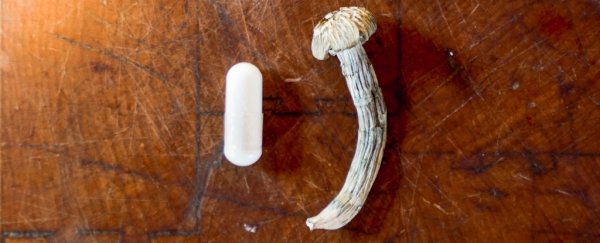When psilocybin - the hallucinogenic compound in magic mushrooms - is used during supportive psychotherapy, there appear to be rapid, substantial and enduring antidepressant effects, according to a new clinical trial.
The randomised study is small and there was no traditional control group, but lead researcher Alan Davis from Johns Hopkins University says he and his team are "really excited about the results."
"We found a statistically significant and very large effect," Davis said in a recent podcast.
Among 24 volunteers with major depressive disorder, researchers found psilocybin-assisted therapy was at least twice as effective as psychotherapy on its own, and more than four times as effective as available antidepressant drugs.
The drug also doesn't require taking a pill every single day, nor does it come with nearly as many side effects as antidepressants or ketamine. Apart from occasional mild to moderate headaches and a few emotional moments, volunteers in the study tolerated psilocybin quite well and there were no serious dangers.
The research included two therapy sessions on the drug with 8 hours of prep and 2 hours of follow-up with a therapist. During the sessions, a pill of psilocybin was administered and participants stretched out on a couch in a living room-like space with headphones on for musical stimulation and eyeshades on to spur inward reflection.
During the trial, roughly half the volunteers began psilocybin therapy straight away, while the other half was put on a 'waiting list' for eight weeks with regular mental health check ups.
This served as a sort of control group, with the immediate treatment group faring significantly better than those in the delayed group who weren't receiving any other forms of treatment.
By the point of four weeks into the trial, 71 percent of the volunteers showed improvement, with a 50 percent drop in depressive symptoms.
A month later, more than half the group were considered 'in remission', and the average depression score dropped from 23 to 8.
"The present trial showed that psilocybin administered in the context of supportive psychotherapy (approximately 11 hours) produced large, rapid, and sustained antidepressant effects," the authors conclude.
Up to a year after the trial, patients were still being checked up on, and researchers plan to publish those results in the future.
Even what we've got so far looks promising. The findings support other recent studies, which suggest psilocybin-assisted therapy can produce significant and lasting antidepressant effects in just one or two sessions.
One prior clinical trial found a high-dose and a low-dose session decreased depression and anxiety in patients with life-threatening cancer. Six months later, 80 percent of the patients were still reaping the benefits.
Another trial among those who weren't responding to other depression and anxiety treatments found similar benefits with two doses that lasted for up to three months.
While it's still not clear how psilocybin improves depressive symptoms, the hallucinogen has been tied to many of the same neural networks as current antidepressant drugs, although it appears to act in a different way.
Brain imaging studies on those with treatment-resistant depression suggest psilocybin has the opposite effect of selective serotonin reuptake inhibitors (SSRIs), increasing emotional connection instead of blunting it like SSRIs tend to do.
In the current trial, for instance, researchers say their volunteers reported mystical, personally meaningful and insightful experiences that were associated with a decrease in depression at 4 weeks.
Major depressive disorder impacts over 300 million people worldwide, and many of them don't respond easily to existing forms of treatment. Finding better ways to treat this mental illness could bring relief to so many.
Twice last year, the United States' Food and Drug Advisory (FDA) designated psilocybin a "breakthrough therapy" in the hopes it would speed up research, and one of these clinical trials is looking specifically at major depression.
The results are just starting to come in, and we will need to verify them amongst much larger cohorts and with stronger control groups, but the findings thus far are strong and researchers remain optimistic.
"This is the first of what is going to be, over the next couple of years, many clinical trials on this topic in depressed populations," says Davis.
"It's looking like in the next four to six years that it's possible the FDA might have enough evidence to determine if this treatment can be made available to the public."
In some areas, the therapy might arrive even sooner. Just recently, Oregon became the first state in the US to legalise psilocybin therapy, given it's promising results among those with PTSD, addiction and also depression.
You might be hearing about psychedelic therapy a lot more in the future.
The study was published in JAMA Psychiatry.
